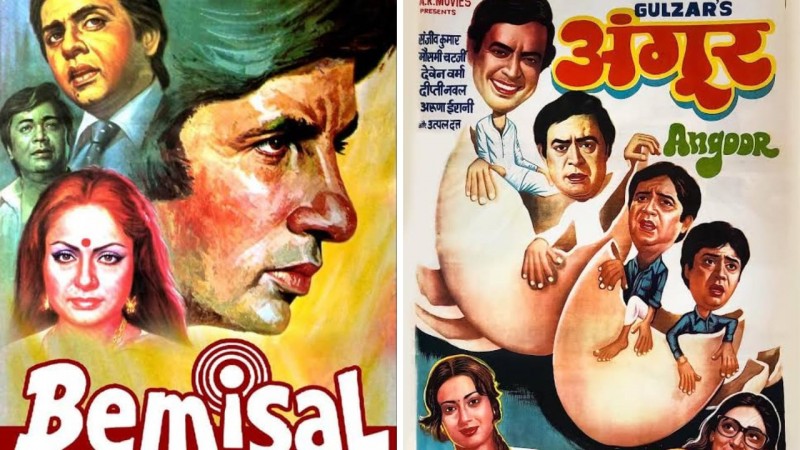
Over the years, there have been many "clashes of the titans" in the Indian film industry, where two or more high-profile films release at the same time in an effort to dominate the box office. Amitabh Bachchan's "Bemisaal" and the under-the-radar "Angoor," which, despite its lacklustre marketing, ended up being a significant critical and commercial success, engaged in one such legendary confrontation. The fascinating backstory of this conflict and the elements that contributed to the divergent outcomes of these two films are explored in this article.
Amitabh Bachchan was without a doubt the biggest star in Indian cinema at the beginning of the 1980s. He had become well-known thanks to his affable on-screen persona and consummate acting abilities. He appeared in the 1982 movie "Bemisaal," which was helmed by Hrishikesh Mukherjee. The Gulzar-helmed comedy "Angoor," which had a modest budget, was on the other side. Both films had in common that they were adaptations of "The Comedy of Errors" by William Shakespeare.
Along with Bachchan, "Bemisaal" featured an ensemble cast that included Vinod Mehra, Raakhee Gulzar, and Deven Verma. Due to Bachchan's star power and the anticipation surrounding his collaboration with the renowned director Hrishikesh Mukherjee, the movie attracted a lot of pre-release buzz. The movie received aggressive marketing, and its songs were well-known before it even opened in theatres.
In contrast, the cast of "Angoor" featured fewer well-known actors, with Sanjeev Kumar and Deven Verma taking the lead parts. The movie's marketing was understated and didn't rely on prominent celebrity endorsements or overt publicity stunts. Gulzar took a subtle approach, keeping the humour of the movie a secret and refraining from giving away too much in the trailers.
The box office result of both films' 1982 releases was unexpected in every way. Due in large part to the intense hype surrounding Amitabh Bachchan, "Bemisaal" opened to an impressive box office haul. But as word of mouth spread, it became clear that the movie fell short of the extremely high expectations. Both critics and viewers thought the film lacked the charm and depth that defined Hrishikesh Mukherjee's earlier works. "Bemisaal" had a promising start, but it was unable to maintain its momentum, and it ultimately failed at the box office.
"Angoor," on the other hand, got off to a slow start. It didn't have a blockbuster debut, and its lack of star power at first hurt it. But those who saw the movie were in for a welcome surprise. Both critics and viewers praised Gulzar's deft use of humour and the outstanding performances by Sanjeev Kumar and Deven Verma. The film's box office receipts started to rise steadily as good word of mouth spread. "Angoor" was a huge commercial success in addition to making back its production costs.
The critical reception of these two films was one of the main factors in the stark contrast in their outcomes. "Angoor" was praised as a triumph of storytelling and acting while "Bemisaal" received criticism for its shoddy storytelling and over-reliance on Amitabh Bachchan's star power.
Shakespearean comedy was expertly adapted for the Indian setting in "Angoor" by Gulzar. The script for the movie was clever and razor-sharp, with amusing dialogue that had the audience in stitches. Deven Verma's flawless comic timing and Sanjeev Kumar's portrayal of the twins who were split up at birth were both masterpieces and added to the charm of the movie. The ability of Gulzar to elicit outstanding performances from his actors and produce a film that is genuinely entertaining was praised by critics.
Contrarily, "Bemisaal" failed to astonish critics and viewers alike. In contrast to Hrishikesh Mukherjee's earlier films, this one's narrative lacked the emotional resonance and depth that made them stand out. Amitabh Bachchan gave his all, but the film fell short due to a shoddy script and a disjointed plot. Given the talent that went into making the movie, audiences were disappointed that it didn't live up to their expectations.
In the world of cinema, the conflict between "Bemisaal" and "Angoor" teaches us a valuable lesson. It emphasises the value of substance over celebrity. Even though Amitabh Bachchan's stardom could not be disputed, the movie's weak plot could not be saved. On the other hand, "Angoor" was a success in showing that a well-written story, supported by talented actors, and directed by a skilled individual, could succeed even without a significant marketing campaign.
In the annals of Indian cinema, the conflict between Amitabh Bachchan's "Bemisaal" and "Angoor" is a fascinating chapter. It serves as an example of how a well-made, low-budget movie with substance can surpass a blockbuster with a star-studded cast but a subpar script. Not only did "Angoor" triumph at the box office, but it also won over viewers and critics. It serves as evidence of the enduring value of narrative storytelling and the significance of expert filmmaking in the world of cinema.
Chunky Panday: Celebrating 61 Years of Bollywood Brilliance